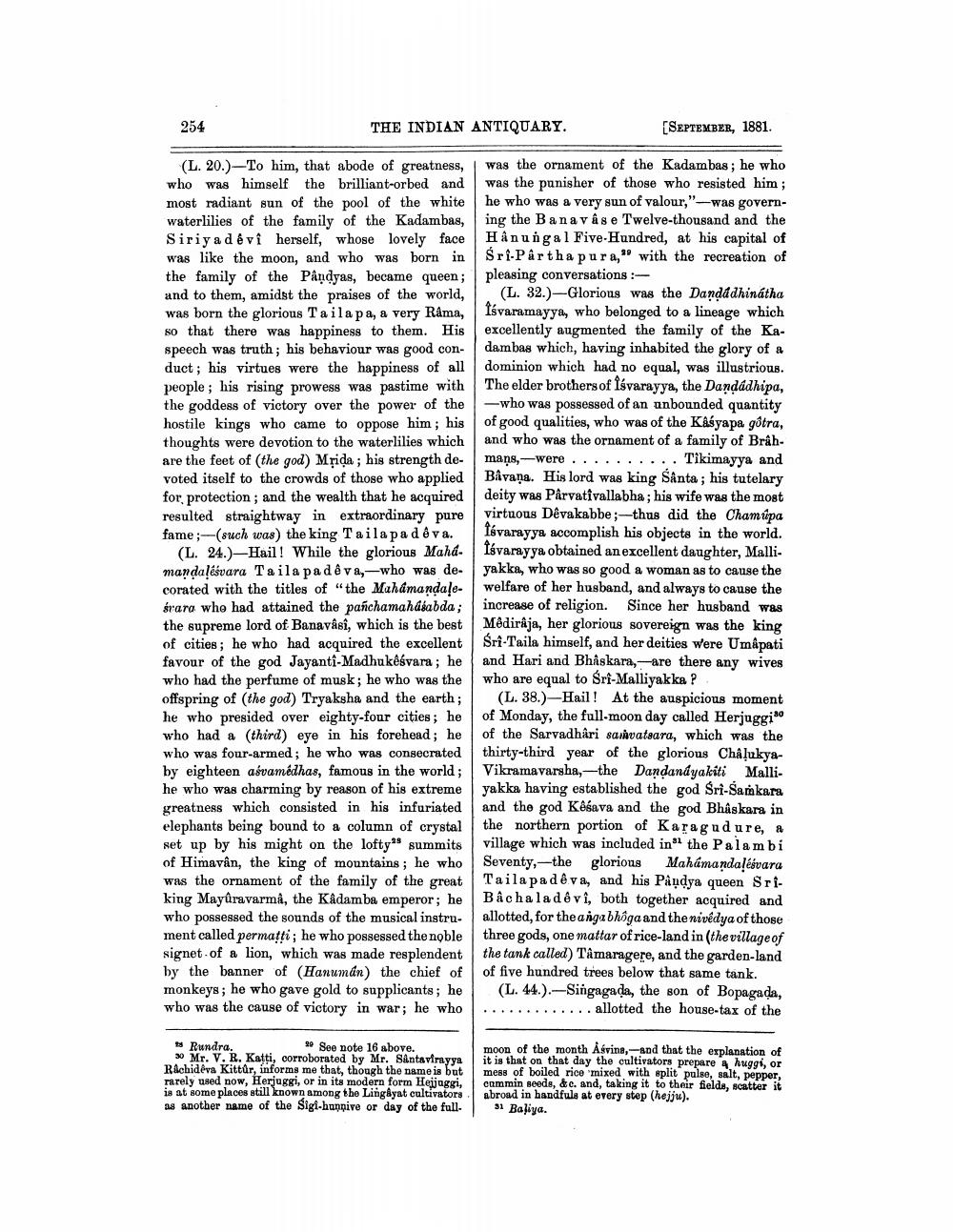________________
254
THE INDIAN ANTIQUARY.
[SEPTEMBER, 1881
(L. 20.)– To him, that abode of greatness, was the ornament of the Kadambas; he who who was himself the brilliant-orbed and was the punisher of those who resisted him ; most radiant sun of the pool of the white he who was a very sun of valour, "-was governwaterlilies of the family of the Kadambas, ing the Bana vâs e Twelve-thousand and the Siriya devi herself, whose lovely face Hånungal Five Hundred, at his capital of was like the moon, and who was born in Sri-Pârtha pura," with the recreation of the family of the Pandyas, became queen; 1 pleasing conversations : and to them, amidst the praises of the world, (L. 32.)-Glorious was the Dandddhinatha was born the glorious Tailapa, a very Ráma, Isvaramayya, who belonged to a lineage which so that there was happiness to them. His excellently augmented the family of the Kaspeech was truth; his behaviour was good con- dambas which, having inhabited the glory of a duct; his virtues were the happiness of all dominion which had no equal, was illustrious. people; his rising prowess was pastime with
The elder brothers of Isvarayya, the Dandadhipa, the goddess of victory over the power of the -who was possessed of an unbounded quantity hostile kings who came to oppose him ; his of good qualities, who was of the Kasyapa gôtra, thoughts were devotion to the waterlilies which and who was the ornament of a family of Brahare the feet of the god) Mrida; his strength de- mang-were .......... Tikimayya and voted itself to the crowds of those who applied Bâvaņa. His lord was king Santa ; his tutelary for, protection, and the wealth that he acquired deity was Pârvativallabha; his wife was the most resulted straightway in extraordinary pure virtuous Dêvakabbe ;--thus did the Cham úpa fame :-(such was) the king Taila pa dê va. Isvarayya accomplish his objects in the world.
(L. 24.) Hail! While the glorious Mahá. Iśvarayya obtained an excellent daughter, Mallimandalesvara Taila pad ê va, --who was de- yakka, who was so good a woman as to cause the corated with the titles of "the Mahamandalo
ith the title of the Mahamandale. welfare of her husband, and always to cause the śraro who had attained the panchamahúsabda; increase of religion. Since her husband was the supreme lord of Banavâsî, which is the best Mediråja, her glorious sovereign was the king of cities; he who had acquired the excellent Sri-Taila himself, and her deities were Umapati favour of the god Jayanti-Madhukėśvara ; he and Hari and Bhaskara, -are there any wives who had the perfume of musk; he who was the who are equal to Sri-Malliyakka P offspring of the god) Tryaksha and the earth; (L. 38.)-Hail! At the auspicious moment he who presided over eighty-four cities; he of Monday, the full-moon day called Herjuggio who had a (third) eye in his forehead; he of the Sarvadhari sajavatsara, which was the who was four-armed; he who was consecrated thirty-third year of the glorious Chalukyaby eighteen asvamédhas, famous in the world; Vikramavarsha,-the Dandandyakiti Mallihe who was charming by reason of his extreme yakka having established the god Sri-Sarkara greatness which consisted in his infuriated and the god Kêśava and the god Bhaskara in elephants being bound to a column of crystal the northern portion of Karagudure, a set up by his might on the lofty*s summits village which was included in the Palambi of Himavân, the king of mountains; he who Seventy,--the glorious Mahamandalesvara was the ornament of the family of the great Taila padeva, and his Paudya queen Sriking Mayuravarma, the Kadamba emperor; he Bâc halad ê vî, both together acquired and who possessed the sounds of the musical instru- allotted, for the angabhôga and the nivedya of those ment called permatti; he who possessed the noble three gods, one mattar of rice-land in the village of signet of a lion, which was made resplendent the tank called) Tâmaragere, and the garden-land by the banner of (Hanumán) the chief of of five hundred trees below that same tank. monkeys; he who gave gold to supplicants; he (L. 44.).-Singagada, the son of Bopagada, who was the cause of victory in war; he who . . . . . . . . . . . . . allotted the house-tax of the
* Rundra.
90 See note 16 above. 30 Mr. V. R. Katti, corroborated by Mr. Santavirayya Rachideva Kittúr, informs me that, though the name is but rarely used now, Herjuggi, or in its modern form Heijaggi, is at some places still known among the Lingayat cultivators as another name of the Sigi-hunnive or day of the full
moon of the month Agvina,--and that the explanation of it is that on that day the cultivators prepare 4 huggi, or mess of boiled rice mixed with split pulse, salt, pepper, cammin seeds, &c. and, taking it to their fields, scatter it abroad in handfuls at every step (hejju).
51 Basiya.




